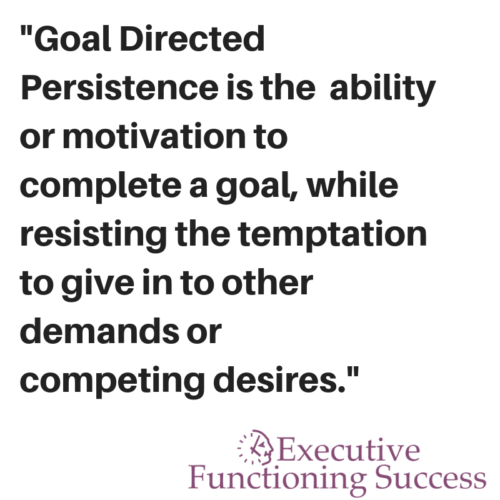Typically people reach out to me because of specific executive function challenges connected to time management and planning. Those skills are just two pieces in a constellation of executive functions that work together to enable a person to make choices to reach goals and lead a purposeful life.
I’ve been thinking a lot about one executive skill that we often don’t focus on: goal-directed persistence. This is the ability or motivation to complete a goal while resisting the temptation to give in to other demands or competing desires.
What Does Goal-Directed Persistence Look Like? Here is a Personal Story to Illustrate.
I am blessed to live in the state of Oregon, one of the most scenic places in the world. A couple of weeks ago I realized that summer was zipping by and I hadn’t made a trip into the mountains. So I made a date with my husband to explore a new area we had never been to – Table Rock Wilderness Area.
 On a Sunday we left at 8 AM armed with lunch, water, hiking sticks and a book published in 1994 about hiking trails in Oregon’s wilderness. Ninety minutes into our drive, we were beyond the knowledge of Google Maps. Shortly thereafter we were out of cellphone range. We promptly got lost in a maze of logging roads.
On a Sunday we left at 8 AM armed with lunch, water, hiking sticks and a book published in 1994 about hiking trails in Oregon’s wilderness. Ninety minutes into our drive, we were beyond the knowledge of Google Maps. Shortly thereafter we were out of cellphone range. We promptly got lost in a maze of logging roads.
Eventually, we backtracked and found the “correct” winding bumpy gravel road that got us to the trailhead. Our guidebook described a two-mile hike to the top. The posted message board explained that due to a landslide, there was a new trail to the top – four miles, one way. Humm… An eight-mile hike? Well, we decided we’d come to hike, so we started off.
In short order, we came across a family with three young children resting in the shade. The dad encouraged us to pass them as they would be going slowly to the top. He enthusiastically explained that as a child he’d once done this climb and that the incredible view was worth the effort. I assured him that at my age I’d be going slowly myself.
An Upward Battle…
After a gentle beginning, the trail began a steep upward turn. Up, up and up until we hit a talus slope that was a jumble of rocks that had broken off a towering basalt cliff. My husband paused because he couldn’t find the trail. I scanned the base of the long cliff face and spotted the trail way off to right. Lovely. We were going to have to scramble over boulders in the hot sun.
 Not being as agile as we once were, we came close to calling it a day. But the promise of an incredible view kicked in my executive function of goal-directed persistence and off we went. It helped that there were ripe salmon berries and huckleberries to snack on! With the boulder scrambling behind us, I asked a young man coming down the trail how much further to the top. When he said that we’d only made it two-thirds of the way, my heart sank. This was one of the hardest trails I’d ever done and I’d hoped to be a lot closer.
Not being as agile as we once were, we came close to calling it a day. But the promise of an incredible view kicked in my executive function of goal-directed persistence and off we went. It helped that there were ripe salmon berries and huckleberries to snack on! With the boulder scrambling behind us, I asked a young man coming down the trail how much further to the top. When he said that we’d only made it two-thirds of the way, my heart sank. This was one of the hardest trails I’d ever done and I’d hoped to be a lot closer.
We decided to pause and eat our lunch, my husband voting for turning back. As we ate, we marveled over the dad who had brought his little kids to do this trail. No way would they make it to the top. And then we heard voices.
Around the corner came the dad and his three kids. I told them that I was really impressed that they had made it so far. To which these little ones, 8, 6 and 4, replied, one at a time, in age order: “We’re going to the top.”
Dad smiled down at his brood and echoed, “We are going to the top.” And off they went.
I looked at my husband and asked, “Are we going to wimp out and go home while those little kids make it to the top?” So off we went.
Goal-Directed Persistence Got Us There!
 As we neared the crest a woman greeted me with, “Have a nice summit.” And then the family came back into view, heading down! I gave the kids each a high five and looked the 8-year-old in eye and told her that someday she would face something very hard and she would want to quit. When that happens, I wanted her to remember this day when she climbed a mountain. If she could climb this mountain she could do anything she wanted to do! I shall never forget her serious determined face as she sealed my words in her mind.
As we neared the crest a woman greeted me with, “Have a nice summit.” And then the family came back into view, heading down! I gave the kids each a high five and looked the 8-year-old in eye and told her that someday she would face something very hard and she would want to quit. When that happens, I wanted her to remember this day when she climbed a mountain. If she could climb this mountain she could do anything she wanted to do! I shall never forget her serious determined face as she sealed my words in her mind.
The view from the summit, almost 5,000 feet, truly was spectacular. To the east was the Cascade mountain range with the majestic Mt. Hood and Mt. Jefferson. To the west was the fertile farmlands of the Willamette Valley, bounded by miles of shimmering coastal range.
The details of that challenging day are so clearly etched into my memory. I am incredibly thankful that we pushed on to the top. I will always remain inspired by that father and the gift he gave his children: the experience of developing the key executive function skill of goal-directed persistence.
Happy Summits!
Marydee


I love reading your personal experiences. I use your “My Time “. Book with my gifted students that have problems with executive function. It works! Thanks
Shirley, I am pleased that you enjoy reading my stories. I have fun writing and wish I had more time to do so! I am thrilled to hear that you are using “Seeing My Time” with your gifted students. Back in the beginning I thought that they were the target audience for my work. Little did I know that so many others had similar problems with executive functions.
I have been dredging my mind for my own summit story, but keep pulling up all the times I didn’t make it. Or a time when I made it to my goal, only to be disappointed. The best times I’ve had were due to luck or synchronicity, not persistence. Persistence seems to lead me to digging a deeper hole for myself, alienating others, or wasting a lot of time and effort for nothing. Or I finally succeed but am too tired to enoy or care. Maybe my real problem is “yes, but”. – “Yes, but my accomplishment wasn’t perfect”.
Marsha, “Yes, but…” is a good self-analysis. Summits don’t need to be BIG mountains or big projects. I savor all of my seemingly “little” accomplishments that require goal-directed persistence, right down to folding the laundry and actually then putting it away. So, yes, perfectionism might be sapping away the joy of accomplishment too. Be kind to yourself. Celebrate the small summits. And don’t knock the value of luck and synchronicity. Take it and run with it! I do! Helps soften the frustration when lots of work seems to get nowhere, or simply spawns more work! Such is life…
I thought about it some more, and came up with 3 items. One was a keepsake box I made at a pet loss support event. They had never done this before, so had no examples, only a choice of a box or a frame, a bunch of different papers and decorations, and some Modge Podge. I sat there blankly for a long time, as others began their projects. I felt like crying or leaving. Finally I chose a fabric I liked, and began to attach it to the box I chose. As I worked, more ideas came, but I had no idea where I was going with it! I just chose the next thing based on whether it would look good with what was already done. My project was not complete as the event ended and everyone was leaving. I chose a few paper scraps and decorations to take with me. I still ended up purchasing one or two items at a craft store to finish with, because by then I had an idea of what I wanted. It looks really nice, and I may bring it to a future event to give someone else an example. Yet I’m still not 100% sure it’s really DONE. But it’s good enough.
Another thing I thought of was when I built my own computer about 25 years ago. It was cobbled together from both new and used parts as I could afford them. After frying the first motherboard, a co-worked helped me diagnose the problem. The issue was resolved, a new motherboard installed, and I had a working computer! It was a Frankenstein computer, but it worked and I used it for a few years.
Then there was the time I completed work on an entryway light that was controlled by FOUR switches. The wires had already been pulled for me inside the walls, but the electrician had goofed something up. After much web surfing and consulting of books on electrical work, I figured out what was wrong, how to correct it, and got it all connected. In turn, I went around and flipped each switch, and it worked! I let out a big “Woohoo!!!!”
I initially discounted all of these things: the box might not be done; the computer looked like junk; and the entryway isn’t done. The light works, but it is just a bare bulb because I need to paint the ceiling before I put up the fixture. Therefore, I felt like I hadn’t really reached the summit. Yet if I told someone else of what I had done, they complimented me on my accomplishment. Now I just need to learn to accept what I DID accomplish.
Marsha, What great accomplishments! They certainly rank as summits in MY book. Back in the day my son and I built a computer together when he was in middle school. What an adventure. We hadn’t a clue what we were doing and made MULTIPLE trips to Frys for parts. We had lots of motherboard issues too. That computer ran for years and years! Please DO celebrate all that you have done and will continue to do. You deserve it.
Great story! Yes, that family gave you a gift, but you also gave a gift to the little girl. I am confident she will remember your words and that hike when she’s older and is facing a tough road. Had you not told her that, she might not think back on the hike when she’s older and struggling, you know? Some things need to be overtly pointed out to be remembered. It’s late, so I’m not sure this is making sense, but I hope it is. Lol :/
Shawn, Thanks so much for your comment. I do hope she remembers. I won’t forget her. And of course, as the excellent ed therapist that you are, you understand that lessons need to be explicitly taught. Good to hear from you and hope all is well.